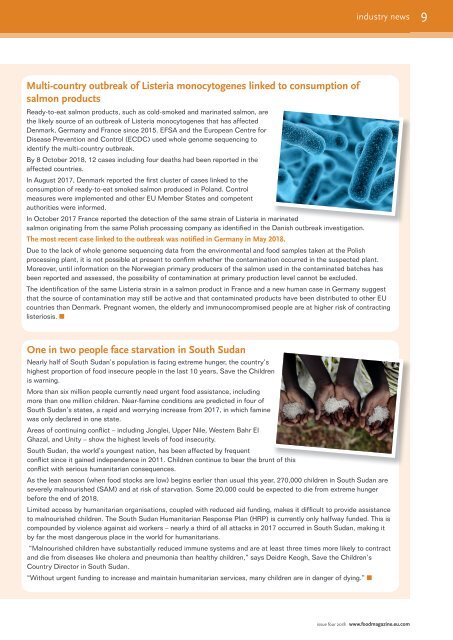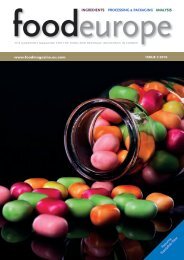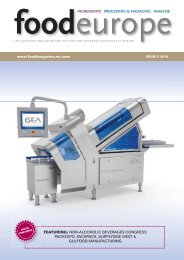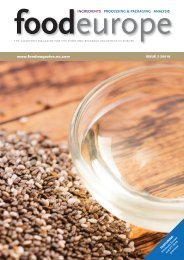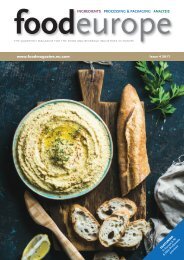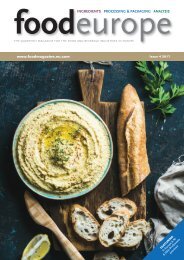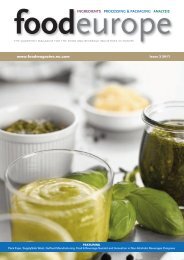Issue 4 2018
You also want an ePaper? Increase the reach of your titles
YUMPU automatically turns print PDFs into web optimized ePapers that Google loves.
industry news<br />
9<br />
Multi-country outbreak of Listeria monocytogenes linked to consumption of<br />
salmon products<br />
Ready-to-eat salmon products, such as cold-smoked and marinated salmon, are<br />
the likely source of an outbreak of Listeria monocytogenes that has affected<br />
Denmark, Germany and France since 2015. EFSA and the European Centre for<br />
Disease Prevention and Control (ECDC) used whole genome sequencing to<br />
identify the multi-country outbreak.<br />
By 8 October <strong>2018</strong>, 12 cases including four deaths had been reported in the<br />
affected countries.<br />
In August 2017, Denmark reported the first cluster of cases linked to the<br />
consumption of ready-to-eat smoked salmon produced in Poland. Control<br />
measures were implemented and other EU Member States and competent<br />
authorities were informed.<br />
In October 2017 France reported the detection of the same strain of Listeria in marinated<br />
salmon originating from the same Polish processing company as identified in the Danish outbreak investigation.<br />
The most recent case linked to the outbreak was notified in Germany in May <strong>2018</strong>.<br />
Due to the lack of whole genome sequencing data from the environmental and food samples taken at the Polish<br />
processing plant, it is not possible at present to confirm whether the contamination occurred in the suspected plant.<br />
Moreover, until information on the Norwegian primary producers of the salmon used in the contaminated batches has<br />
been reported and assessed, the possibility of contamination at primary production level cannot be excluded.<br />
The identification of the same Listeria strain in a salmon product in France and a new human case in Germany suggest<br />
that the source of contamination may still be active and that contaminated products have been distributed to other EU<br />
countries than Denmark. Pregnant women, the elderly and immunocompromised people are at higher risk of contracting<br />
listeriosis. n<br />
One in two people face starvation in South Sudan<br />
Nearly half of South Sudan’s population is facing extreme hunger, the country’s<br />
highest proportion of food insecure people in the last 10 years, Save the Children<br />
is warning.<br />
More than six million people currently need urgent food assistance, including<br />
more than one million children. Near-famine conditions are predicted in four of<br />
South Sudan’s states, a rapid and worrying increase from 2017, in which famine<br />
was only declared in one state.<br />
Areas of continuing conflict – including Jonglei, Upper Nile, Western Bahr El<br />
Ghazal, and Unity – show the highest levels of food insecurity.<br />
South Sudan, the world’s youngest nation, has been affected by frequent<br />
conflict since it gained independence in 2011. Children continue to bear the brunt of this<br />
conflict with serious humanitarian consequences.<br />
As the lean season (when food stocks are low) begins earlier than usual this year, 270,000 children in South Sudan are<br />
severely malnourished (SAM) and at risk of starvation. Some 20,000 could be expected to die from extreme hunger<br />
before the end of <strong>2018</strong>.<br />
Limited access by humanitarian organisations, coupled with reduced aid funding, makes it difficult to provide assistance<br />
to malnourished children. The South Sudan Humanitarian Response Plan (HRP) is currently only halfway funded. This is<br />
compounded by violence against aid workers – nearly a third of all attacks in 2017 occurred in South Sudan, making it<br />
by far the most dangerous place in the world for humanitarians.<br />
“Malnourished children have substantially reduced immune systems and are at least three times more likely to contract<br />
and die from diseases like cholera and pneumonia than healthy children,” says Deidre Keogh, Save the Children’s<br />
Country Director in South Sudan.<br />
“Without urgent funding to increase and maintain humanitarian services, many children are in danger of dying.” n<br />
issue four <strong>2018</strong> www.foodmagazine.eu.com


